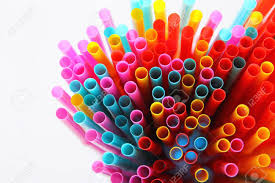 In the beginning, straws were actually made of straw…well, actually rye grass. Then, in the 1880s, a resident of Washington, DC, decided he didn’t like the residue that the straw left in his mint julep. So he made his own device by wrapping strips of paper around a pencil. He then removed the pencil and glued the paper strips together.
In the beginning, straws were actually made of straw…well, actually rye grass. Then, in the 1880s, a resident of Washington, DC, decided he didn’t like the residue that the straw left in his mint julep. So he made his own device by wrapping strips of paper around a pencil. He then removed the pencil and glued the paper strips together.
His paper straw invention became the standard until the 1960s when more durable plastic straws began to dominate the market. Other American innovations came to market like the flexible straw and flavored straws that dissolved as milk passed through them creating, for example, a chocolate-flavored drink. Then the bright idea came to develop a line of cereal straws. The idea was to drink milk through one large, tubular Fruit Loop or Cocoa Krispie. Reviews were unkind.
Today plastic straws are on the cutting block. American and Italian cities are banning their use for good reason. They don’t decompose easily, and they are a major culprit in the 8 million metric tons of plastic that end up in the ocean each year. Even McDonald’s substituted paper straws for plastic straws, and many people are trying to find alternatives—including those made from metal, bamboo, corn, and rice–to stop the flow of plastic pollution into the environment.
Italian ingenuity has come up with a solution: pasta. Bars in Italy are using bucatini—straight, tubular lengths of uncooked pasta—for all types of cold drinks. Like paper, pasta straws last about an hour before softening up, but it decomposes overnight unlike paper straws, which take 30 to 60 days. It is tasteless in cold drinks; it is not advisable for use in hot drinks unless you want a noodle dish or a tongue burn.
And now two companies are producing pasta straws: Stroodles based in London and The Amazing Pasta Straw based in Malibu, California. They are vegan, but not gluten-free.
Why do we need so many straws? Of course, we need them for people who are not independent. And they seem useful for smoothies. In the past, kids used candy sticks with a porous center to slurp juice from real lemons. And some kids today bite off the ends and use red vines as straws. For adults, drinking soft drinks and coffee in the car can be considered driving while distracted.
For Italy and the rest of Europe, the European Commission has gone further than the United States. Following the initiative on plastic bags launched in 2015, the European Union is now turning its attention to all disposable plastic products which, together, represent 70% of marine litter in the oceans, seas and beaches of Europe. The new rules will cover the prohibition of certain plastic products, in particular those where there are easily available and economically accessible alternatives. Single-use plastic products will be excluded from the market; for example, the ban will apply to cotton buds, cutlery, plates, straws, beverage mixers and balloon rods—products that must be manufactured in the future exclusively with sustainable materials.
Brava, Europe!

Thank you, BArbara. I despair at us ever catching up with the rest of the world. Anne